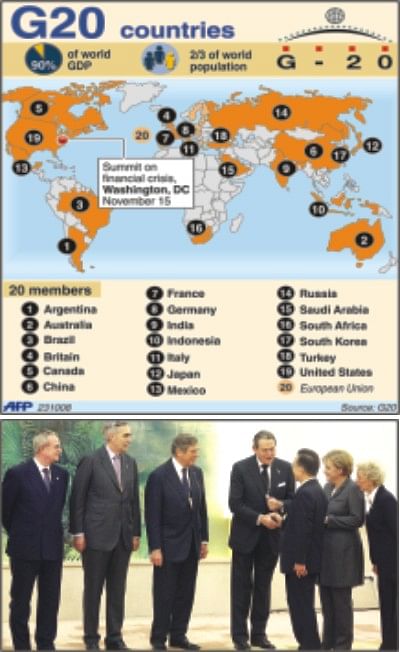Govts shield businesses

(Top)G20 is set to meet on November 15 in Washington for a summit on the global financial crisis. (Bottom) German Chancellor Angela Merkel (2R) looks on as Chinese Premier Wen Jiabao (3R) talks to German entrepreneurs at the Great Hall of the People in Beijing yesterday, ahead of the Asia-Europe Meeting. Photo: AFP
Governments rolled out fresh measures yesterday to shield businesses and banks from the financial maelstrom as deepening fears of a global recession ensured another battering for stock markets.
As new figures showed cross-border lending by banks had suffered its biggest decline for a decade, French President Nicolas Sarkozy announced a sovereign wealth fund to protect strategically important firms while Britain's government leant on bank bosses to start loosening the purse strings.
The fresh falls came despite an announcement of further measures designed to restore confidence in the finance sector and among consumers.
Japan's central bank said it had injected 600 billion yen (6.2 billion dollars) into the short-term money market while the International Monetary Fund moved to bail out Pakistan, which could need as much as 15 billion dollars to help pay mounting foreign debt.
Governments around the world have unveiled packages over the last month totalling more than three trillion dollars, including loan guarantees and cash injections, to restore confidence to the financial system and reverse a sharp slowdown in lending.
The scale of the slowdown was illustrated by figures from the Bank for International Settlements, the world's biggest central banking body, which showed cross-border lending by banks fell 1.1 trillion dollars in the second quarter of 2008.
Banks were also hit by one trillion dollars' worth of withdrawals, particularly by clients in the United States, Britain and Switzerland.
Sarkozy said the events of recent weeks had discredited free-market ideology and showed that economies needed strong state intervention to succeed.
"The ideology of the dictatorship of the market ... is dead," he said, in a speech in which he announced that France would set up a sovereign wealth fund to "intervene massively" in companies of national strategic importance.
In Britain, the finance minister was meeting the heads of major banks to urge them to relax their lending conditions for small firms.
Chancellor of the Exchequer Alistair Darling and Business Secretary Peter Mandelson were expected to tell bank chiefs that they had to help small firms through the looming recession.
Europe yesterday called for greater help from Asia in tackling the "unprecedented" challenges of the global economic crisis, on the eve of a summit in Beijing between leaders of the two regions.
However a diplomatic spat threatened to distract the two-day Asia Europe Meeting (ASEM), after the European Union parliament defied warnings from China and awarded its major human rights award to a prominent Chinese dissident.
With both continents struggling to cope with the worst economic meltdown since the Great Depression, the 43 nations belonging to ASEM were expected to see the two regions agree on tighter cooperation in tackling the turmoil.
"We swim together or we sink together," European Commission President Jose Manuel Barroso said after arriving in Beijing, as he called for Asia and Europe to work together if they were to survive the crisis.
"We need Asia to be on board, and more particularly countries like China, India (and) Japan," he told reporters, outlining the "unprecedented" challenges facing the global economy, under threat of a looming worldwide recession.

 For all latest news, follow The Daily Star's Google News channel.
For all latest news, follow The Daily Star's Google News channel. 



Comments